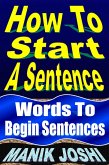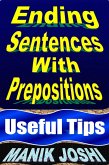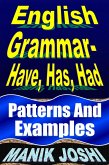This Book Covers the Following Topics: Transitional Expressions -- Definition Transitional Expressions Punctuation Rules 01. Transitional Expressions -- Addition 02. Transitional Expressions -- Cause and Effect 03. Transitional Expressions -- Concession 04. Transitional Expressions -- Condition 05. Transitional Expressions -- Consequence 06. Transitional Expressions -- Contrast 07. Transitional Expressions -- Dismissal 08. Transitional Expressions -- Illustration 09. Transitional Expressions -- Emphasis 10. Transitional Expressions -- Exception 11. Transitional Expressions -- Explanation 12. Transitional Expressions -- Generalization 13. Transitional Expressions -- Location 14. Transitional Expressions -- Purpose 15. Transitional Expressions -- Quantifier 16. Transitional Expressions -- Reference 17. Transitional Expressions -- Sequence 18. Transitional Expressions Similarity 19. Transitional Expressions -- Summary 20. Transitional Expressions -- Time Exercise: 1(A) and 1(B) Exercise: 2(A) to 2(C) SAMPLE THIS: Transitional Expressions -- Definition Meaning of 'Transition' -- to go from one point to another "Transitional Expressions" = "Transitional Words" + "Transitional Phrases" "Transitional (or Transition) Words" are also known as "connecting words", "linking words" or "signal words" "Transitional (or Transition) Phrases" are also known as "connecting phrases", "linking phrases" or "signal phrases" "Transitional Expressions" (also "Transitions") could be defined as follows: • 'Transitional expressions' are words or phrases that provide bridges between sentences, parts of sentences, paragraphs and sections. • 'Transitional expressions' connect and relate sentences and paragraphs. • 'Transitions expressions' signal the relationship between sentences and paragraphs. • 'Transitions expressions' state the connections between ideas. • 'Transitions expressions' help carry over a thought from one part of a sentence to another, from one sentence to another, from one paragraph to another, from one section to another, or from one idea to another. • 'Transitional expressions' connect ideas from sentence to sentence and paragraph to paragraph. • 'Transitional expressions' are placed in the beginning, middle, or end of the sentences/paragraphs to explain connections between two or more ideas. • 'Transitional expressions' help carry over a thought from one idea to another. • 'Transitional expressions' produce clearer expression, by eliminating the excessive use of such words as 'and', 'but', 'for' 'nor', 'or' 'so' 'yet', etc. Choosing Transitional Expression -- Some transitional words and transitional phrases belong to more than one category. A transitional expression can change the whole meaning of a sentence. Therefore, you should choose the transition that best conveys your meaning. You should also avoid repetition and use different transition words or phrases in the same category if necessary. Placing transitional words: There are three options for placing transitional words: • The beginning of a sentence [Most common] • The middle of a sentence • The end of a sentence [Least Common]
Dieser Download kann aus rechtlichen Gründen nur mit Rechnungsadresse in A, B, CY, CZ, D, DK, EW, E, FIN, F, GR, H, IRL, I, LT, L, LR, M, NL, PL, P, R, S, SLO, SK ausgeliefert werden.









